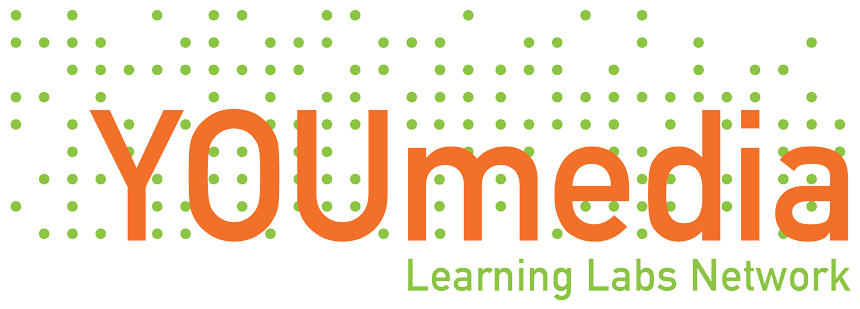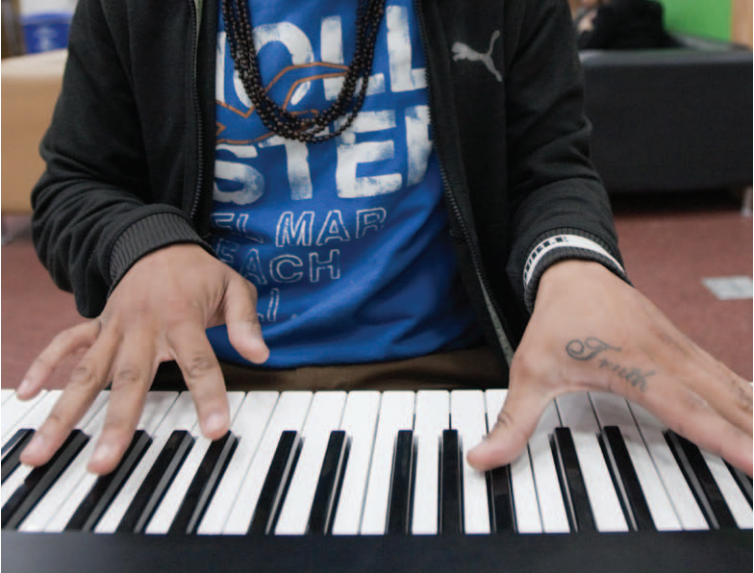Mentorship, digital tools, and adaptable interest-driven learning are the recipe for YOUmedia success.
Since opening the first YOUmedia space in Chicago’s Harold Washington Library Center (HWLC) in 2009, organizers from the Digital Youth Network, MacArthur Foundation, and the Chicago Public Library have worked to empower youth using digital media tools and mentorship. The informal, yet engaging, atmosphere—in conjunction with dedicated mentors and 21st century tools—proved to be an ideal environment for Connected Learning, an educational model that combines teens’ interests, peer culture, and academic content. The space is now the creative home for 350-500 teens each week.
This past May, researchers from the University of Chicago Consortium on Chicago School Research published a three-year study to document the program, and investigate how it has fulfilled designers’ aspirations.
Their findings showed the YOUmedia space at the HWLC specifically engages diverse students through a combination of structured and unstructured activities, and that adult mentors are key to the engagement.
Researchers also found that the open, informal vibe of the space is another huge draw for youth, one of whom explained, “I don’t know other places that I’d go to…that aren’t pushing some mission on you, like, ‘Let’s save the youth of our urban communities.’ I’m sure YOUmedia has that as one of their goals, but they’re not forcing it down your throat.”
This kind of student-perpetuated credibility helped increase attendance, which has relied more on word of mouth than other methods of youth outreach. Many of the students surveyed explained that they heard about the space through friends, and that they were surprised once they entered its doors. “I’d never known for the library to be, you know, fun for teenagers. I thought it was just all books,” said one participant, Tasha, who visited the space mostly to socialize with friends.
Its divergence from a more traditional and structured afterschool program has also proved to be a boon to the space. One of the most high-profile success stories to arise from YOUmedia HWLC is 20-year-old Chance the Rapper, who was recently interviewed by Jessica Hopper for Chicago Magazine. The hip-hop wunderkind holed up inside YOUmedia HWLC to record his first album, “10 Day,” during his 10-day suspension from school. The album became an underground success, and he recently played to more than 100,000 people at the Lollapalooza music festival held in Chicago.
The crux of YOUmedia HWLC’s success, however, ultimately lies in the adaptability of its programming, and the strength of its mentorship. The study regularly stressed the vibrancy of the relationships formed between mentors and youth, and many youth, regardless of their commitment to the space, mentioned their close relationship to the staff—even the security guards. Several others also said that they could relate to the adults at the YOUmedia HWLC better than the other adults in their lives.
One participant, Kayla, said that her relationship with staff has greatly affected her life outside of the space as well. “Despite her lack of participation, Kayla still reports that she has gained knowledge through her close relationships with the adults at YOUmedia,” researchers explained in the report. “She says that because of her time in the space and the social interactions she has had, she has learned to be more open and confident in talking to new people. She feels more optimistic about the world because there are adults who respect teens at YOUmedia, and she hopes that adult respect for teens can spread throughout the rest of the world.”
Of the students like Kayla who frequent the downtown hub, researchers found that are five different types of participants:
- Socializers visit the space to chat with friends, play games, and occasionally attend performances (18 percent of those surveyed)
- Reader/studiers come to YOUmedia HWLC to read, talk to librarians, and work on schoolwork (28 percent of those surveyed)
- Floaters may play video games, use the computers, and hang out with friends all during a single visit (21 percent of those surveyed)
- Experimenters use computers and keyboards to create music, but rarely interact with mentors (11 percent of those surveyed)
- Creators: create music in the studio, as well as other art, and takes advantage of mentorship (22 percent of those surveyed)
YOUmedia HWLC has been particularly successful in engaging African American males, who compose about 40 percent of their teen participants. Many, like Chance the Rapper, come to YOUmedia to record and produce music in the sound studio. Given that African American males historically have been underserved by schools and out-of-school programs, this finding is particularly encouraging. That said, the reach is not as extensive as it could be. Although 50 different public and private high schools are represented at YOUmedia, the teens skew more heavily from selective schools.
It has not all been easy sailing. As the report notes:
“The design of the program, which privileges teen choice, poses challenges. In order to engage teens, adults deliberately seek out their interests and design workshops, projects, and theme-based sessions to appeal to their varied inclinations. Staff must cajole and persuade in order to attract teens to the workshops and projects where they can build their skills and deepen their expertise. Staff members have found it particularly difficult to encourage novice youth to develop the skills they need to take advantage of the high-profile events that are available to teens with more advanced skill levels.”
It is undeniable that teens love the program for the safe space to connect with their peers and the ability to use digital tools, as one creator, Arianna, explained. “I have access to things that I couldn’t have used before to get what I need to get done. And now I feel like what was already within me has been exposed to me or revealed to me, and now I’m using it,” she said. But ultimately it is the adults and the mentorship they provide that keeps students coming back.
The report concludes with some helpful advice for others building similar spaces, including how connected learning as a learning model might be applied and expanded in other spaces.
Other interesting findings:
- YOUmedia students feel they are better at technology than their peers.
- A majority of the creators and about half of others improved their digital media skills due to YOUmedia
- YOUmedia helped teens improve academic skills, especially writing and communication.
- Nearly three-fourths of teens reported that YOUmedia has helped them understand more about the opportunities available to them after high school.
- For adult mentors, building skills versus engaging youth is a regularly conundrum.
- The challenges of melding two organizational cultures (library and YOUmedia) and maintaining technology emerged over the course of YOUmedia’s implementation and have been ongoing.
By Kelsey Herron

